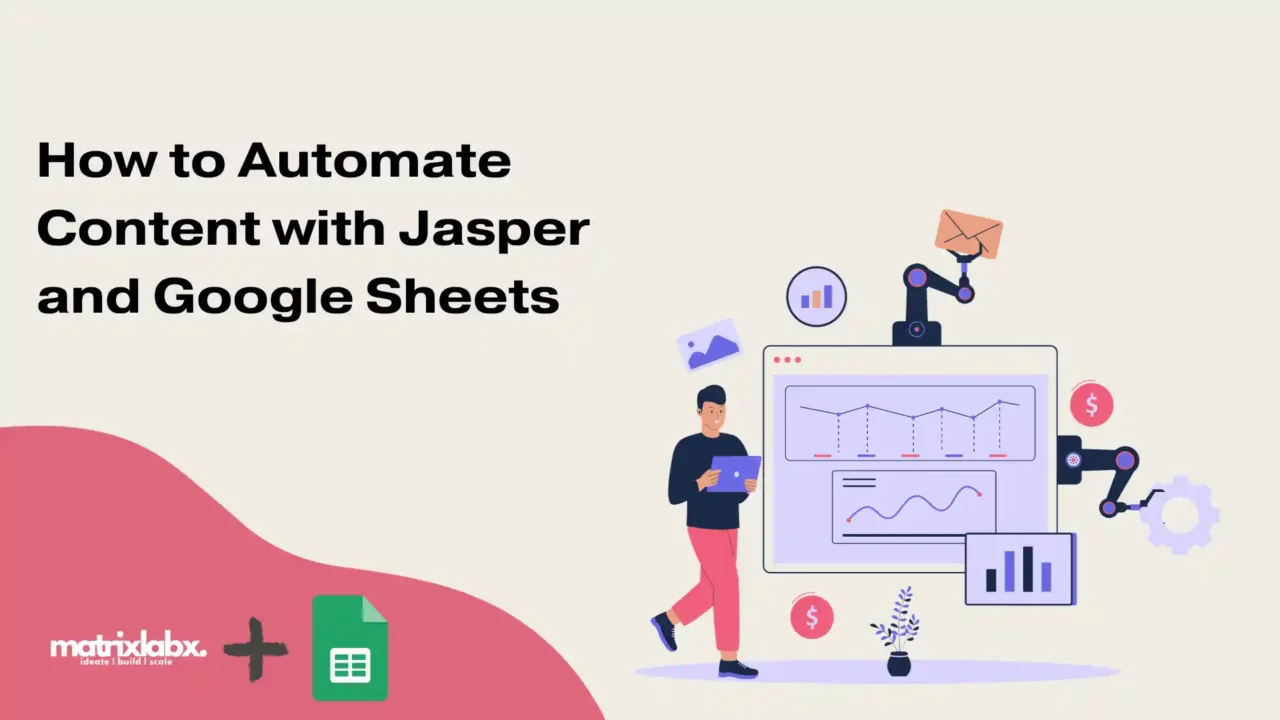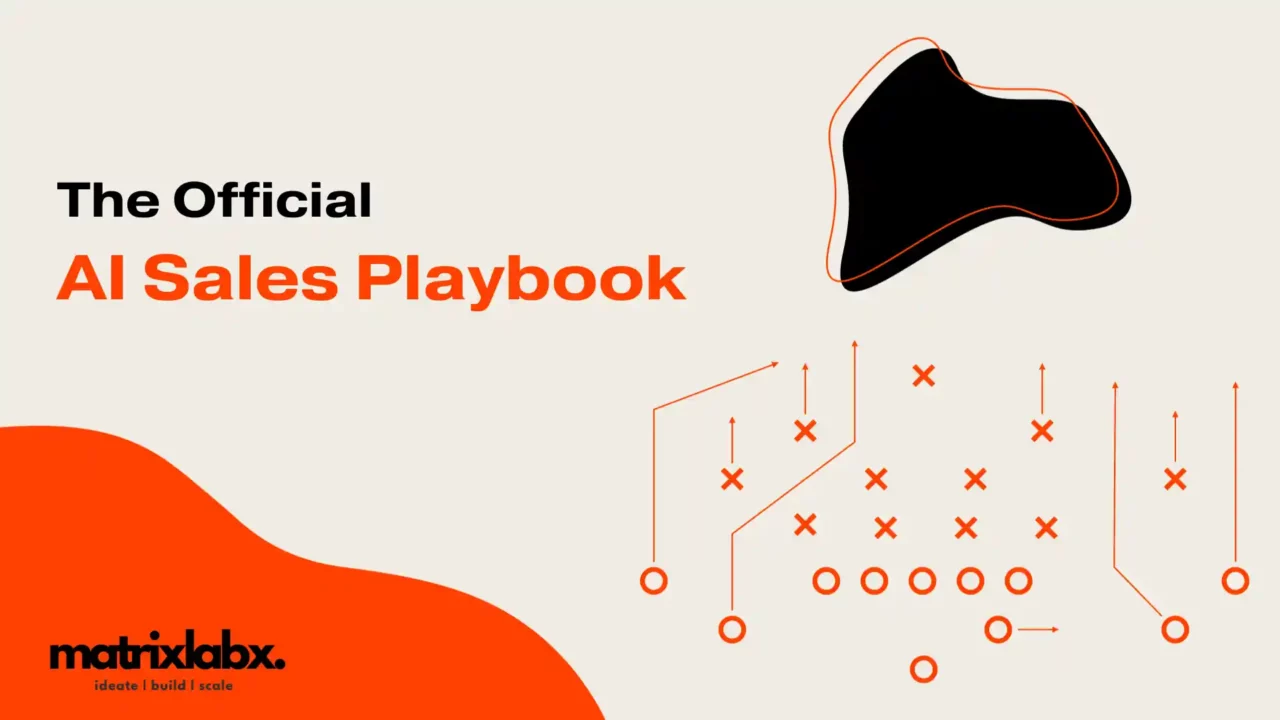The Official AI Sales Playbook
The Official AI Sales Playbook
Since introducing Artificial Intelligence (AI) into customer engagement, sales have undergone significant changes.
From virtual assistance tools that help customers quickly find what they need to intelligent sales scripts that can be tailored to any buyer, AI is drastically transforming how companies approach sales growth.
As a Sales Manager, it is paramount for you to understand these changes and adopt an AI-enabled strategy if you want your business to remain competitive in today’s marketplace.
This guide provides the essential playbook for unleashing the power of AI before your competition does!
Introduction: The Official AI Sales Playbook
Artificial Intelligence is rapidly changing how we do business, and sales is no exception. To stay ahead of the competition, it is essential to have a solid AI sales strategy in place.
That’s why we’ve created The Official AI Sales Playbook – a comprehensive guide for navigating the world of AI in sales. Our playbook will walk you through everything from understanding the basics of AI to implementing advanced AI techniques in your sales process. Learn how to use conversation intelligence software. Our book serves as a sales playbook for SDRs to the VP of Sales. And trusted by overambitious builders of business.
With insights from experts in the field and real-life case studies, this playbook is a must-read for anyone looking to revolutionize their sales approach with the power of AI. So why wait?
Download your copy today and prepare to take your sales game to the next level!
What is AI?
What is AI? Simply put, AI stands for artificial intelligence. It refers to developing machines and computer programs that can perform tasks that typically require human intelligence, such as learning, problem-solving, and decision-making.
AI aims to give machines the ability to think, reason, and learn like humans. Some examples of AI include self-driving cars, virtual personal assistants like Siri and Alexa, and even chess-playing robots.
AI has the potential to revolutionize the way we live and work, with applications ranging from healthcare to finance to entertainment. As AI continues to evolve and advance, it has the potential to solve some of the world’s most pressing problems and change the way we approach complex issues. How to Create a Revenue Strategy in 7 Easy Steps
Why is AI important for sales?
As technology advances, it has become clear that AI plays a critical role in sales. These days, most companies rely heavily on AI-powered systems to manage different aspects of their sales processes.
AI can help businesses identify prospective customers more efficiently by providing insights into customer behavior and purchase patterns. Moreover, AI can assist sales teams in predicting customer preferences, enabling them to tailor their approach more effectively.
AI also means that repetitive and time-consuming tasks, such as scheduling meetings and sending reminders, can be delegated to automated systems.
AI streamlines and optimizes the sales process, allowing businesses to operate more efficiently and effectively in a highly competitive market.
7 AI Sales Use Cases and Results Before and After
The benefits of using AI in sales

Artificial Intelligence (AI) has become a game-changer for most industries, and sales is no exception. By utilizing AI technology, businesses can gain deeper insights into their customers’ preferences and needs, enabling them to sell more effectively.
The benefits of using AI in sales go beyond increasing productivity – it can help identify potential leads and personalize the sales experience for each customer. AI can also assist in predicting future trends and aid in decision-making.
With the help of AI, sales teams can analyze data more efficiently, reduce labor costs, and optimize customer interactions, resulting in increased sales revenue and improved customer loyalty.
The benefits speak for themselves: in today’s competitive market, businesses need to harness the power of AI in sales to stay ahead of the curve.
How to use this playbook
The playbook is your go-to resource guide for effectively managing tasks and achieving success. The first step to using this playbook is to familiarize yourself with its contents.
Please take a moment to review the various sections and familiarize yourself with the areas they cover. Once you’ve done that, identify the tasks you need to complete and flip to the relevant sections to find guidance and tips on how to accomplish those tasks effectively.
This playbook is designed to simplify complex processes and streamline your work, so take advantage of the wealth of knowledge it provides. With the right mindset and approach, this playbook will become your roadmap to success.
Exploring the Benefits of AI-based Sales Automation
As businesses continue to seek ways to streamline their operations, AI-based sales automation has emerged as a highly effective tool.
By utilizing advanced learning algorithms and machine intelligence, sales teams can significantly reduce the amount of manual labor required for their daily tasks.
The benefits are numerous: not only does it reduce the potential for human error, but it also allows for more efficient and accurate forecasting. This opens up new opportunities for companies to expand their reach and tap into new markets.
With AI-based sales automation, businesses can stay ahead of the curve and remain competitive in a rapidly evolving market.
Part 1: Understanding Your Target Audience with AIBrandPad

One of the most important aspects of marketing is understanding your target audience. With AIBrandPad, you can gain valuable insights into your ideal customers.
This AI-powered platform analyzes data from various sources, allowing you to create highly targeted marketing campaigns. By knowing your audience’s interests, preferences, and behaviors, you can tailor your messaging to resonate with them.
This can lead to increased engagement, higher conversion rates, and, ultimately, more sales. Take advantage of the opportunity to connect with your audience – try AIBrandPad today.
Who are your ideal AI customers?
In the world of artificial intelligence, identifying your ideal customer is crucial.
For us at the forefront of AI development, our ideal customer consistently strives to enhance their workflow, stay ahead of the curve, and leverage cutting-edge technology.
Our ideal customer is someone who understands that AI is not a replacement for human intelligence but a way to enhance it and optimize their business processes. Our AI customers strive for innovation, efficiency, and growth.
They are businesses and individuals who recognize that AI is not just a future trend, but a necessity for the present. Together, we can transform the world of automation.
Struggling to Keep Up with Content Demands?
In today’s digital landscape, creating consistent, high-quality content is more challenging—and more important—than ever. Without a clear plan and the right tools, your brand risks falling behind in the crowded marketplace.
What are their pain points and challenges?
As businesses grow and evolve, they encounter various pain points and challenges that can hinder their progress. From managing finances to handling customer service inquiries, companies face numerous obstacles to overcome to succeed.
For example, they may need help with marketing their brand, keeping up with the latest technology trends, or finding and retaining top talent. To address their pain points and challenges effectively, businesses must first identify them and develop a strategic plan to overcome them.
This can involve implementing new processes, seeking expert advice, or leveraging innovative tools and solutions. With the right approach and mindset, any obstacle can be overcome, allowing businesses to continue thriving and growing.
What are their goals and objectives?
Success and progress are often measured by one’s ability to set goals and objectives and then work towards achieving them.
The same holds for individuals, organizations, and even nations. Goals and objectives serve as the guiding light that directs actions, facilitates decision-making, and drives toward success.
They provide direction, purpose, and motivation crucial for growth and development. What are their goals and objectives? It is a question that anyone or anything can ask, and the answer can reveal much about the person, group, or entity in question.
Whether it’s a personal career goal, a company’s sales targets, or a country’s national aspirations, goals and objectives are the driving force that propels us forward toward greatness.
How can AI help them achieve their goals?
Artificial intelligence (AI) can revolutionize how we achieve our goals. One of the biggest advantages of AI is its ability to process vast amounts of data at lightning speeds, making it easier to identify patterns, trends, and insights that can help us make better-informed decisions. Learn about MatrixLabX and content automation.
Whether we want to improve our productivity or grow our business, AI can provide us with the tools to achieve our goals more efficiently and effectively.
The possibilities are endless, from chatbots that can provide personalized customer service to predictive analytics that can help us optimize our workflows.
So, if you’re looking to get ahead and achieve your goals, it’s time to start exploring the power of AI. #1 Business Transformation Guide to Bring Your Brand to New Heights
The Basics of AI Sales – What It Is and How to Make the Most of It

As technology advances, AI sales become more prevalent in the business world. Many companies are beginning to realize the benefits of this innovative technology.
AI-driven sales can accurately analyze customer data, provide personalized recommendations, and predict future purchasing behavior. But what is AI sales, exactly?
It utilizes artificial intelligence to enhance the sales process, from lead generation to closing a deal. To maximize the benefits of AI in sales, businesses should prioritize integrating it into their existing sales processes, leveraging its capabilities to streamline and automate tasks.
With the help of AI-driven sales, companies can deliver better customer experiences, save time and resources, and ultimately increase their revenue.
Part 2: Qualifying Leads with AI
In today’s fast-paced business environment, leads are the lifeblood of any organization. However, not all leads are created equal, and it can be challenging to identify which ones are worth pursuing. This is where AI comes in.
By leveraging machine learning algorithms, businesses can quickly and accurately qualify leads based on various criteria, including demographics and purchasing behavior.
Through this process, businesses can prioritize their efforts and focus on leads most likely to convert into customers.
With the ability to capture, analyze, and qualify leads in real-time, AI has revolutionized how businesses approach lead generation and sales.
How to identify leads that are a good fit for your AI product or service
In today’s marketing world, identifying the right leads is crucial to the success of your business, especially when it comes to AI products and services.
The most effective approach is to identify leads that demonstrate genuine interest in your offering, have real-world use cases, and align with your company’s core values.
By narrowing your focus, you can streamline your sales funnel, saving time and money and achieving a higher conversion rate. Additionally, keep a keen eye out for industry leaders and influencers who are already familiar with AI technology and can help enhance your marketing efforts.
With a strategic approach, a customer-centric mindset, and a little research, you can identify the leads that are the best fit for your AI product or service, setting your company on a path toward success.
AI Integration in Marketing
Nearly 60% of marketers now rely on AI to streamline processes, generate content, and analyze data, a trend expected to grow in 2025, underscoring the role of AI-driven DMaaS platforms in modern marketing strategies. See pricing.
How to use AI to qualify leads more efficiently and effectively
Qualifying leads can be time-consuming and daunting in today’s fast-paced business world. However, thanks to advancements in Artificial Intelligence (AI), this process can now be performed more efficiently and effectively.
By leveraging AI, businesses can sort through vast amounts of data and identify potential leads that match specific criteria. The system can analyze customer interactions, browsing data, and previous purchases to determine the likelihood of converting a lead into a customer.
By automating the lead qualification process, companies can save time and resources, allowing them to focus on other important aspects of their business. With the help of AI, businesses can now convert more leads and grow their customer base with greater efficiency than ever before.
Part 3: Prospecting with AI
In today’s world, technology is advancing at an unprecedented rate. The use of AI has completely transformed the way businesses operate.
One area where AI is becoming increasingly useful is prospecting. Businesses can efficiently and accurately identify potential customers using advanced algorithms and machine learning.
This will not only save time but will also help to increase sales and revenue. With AI technology, businesses can track customer behavior, predict their needs and preferences, and tailor their outreach strategies accordingly.
As businesses expand and compete in an increasingly dynamic market, incorporating AI into their prospecting practices will be crucial for success. 10 Explosive Business Consulting Services for Massive Growth
How to use AI to find and reach new prospects
Artificial intelligence (AI) has revolutionized the way businesses approach prospecting. Gone are the days of endless cold calls and tedious market research.
Instead, intelligent software algorithms can quickly analyze data and identify potential new customers with uncanny accuracy. Marketing teams can then use this information to customize outreach techniques tailored to each prospect.
With AI-driven lead generation, organizations can save time, reduce costs, and improve conversion rates.
Whether you’re looking for a new method to expand your sales pipeline or aim to optimize your existing outreach strategy, harnessing the power of AI is an excellent way to find and reach new prospects.
Affordable SEO Solutions That Drive Real Results
Matrix Marketing Group Delivers Customized SEO Strategies with Transparent Pricing for Maximum ROI. See SEO Services.
How to personalize your outreach to each prospect
In today’s world of sales, personalization is key.
A one-size-fits-all approach no longer cuts it. With so much competition, prospects are looking for companies that take the time to understand their unique needs and challenges. So, how can you personalize your outreach to each prospect?
First, do your research and get to know them. This includes looking at their company website, social media profiles, and any other online presence they may have.
Next, tailor your messaging to their specific pain points and goals. If you can show that you understand their challenges and have a solution to help them overcome them, you’ll be well on your way to building a strong, meaningful relationship.
Remember, personalization isn’t just about using someone’s first name or sending a generic message with a few tweaks. It’s about taking the time to truly understand your prospects and delivering value that speaks directly to their needs.
How to follow up with prospects in a timely and effective manner
Following up with prospects can be daunting, but it’s a crucial step in closing a deal. The key is to do it in a timely and effective manner.
One way to accomplish this is to have a clear plan in place. Take note of when you contacted the prospect and set a reminder to follow up within a designated timeframe. This demonstrates that you value their time and are committed to delivering excellent service.
When following up, be sure to personalize your message and remind them of the benefits of your product or service. Remember that a persistent but polite follow-up is essential for building long-lasting relationships with prospects.
By following these simple guidelines, you can ensure you follow up with prospects promptly and effectively. The 10 Unbelievable Sales Pipeline Metrics You Can’t Miss
Part 4: Demoing Your AI Product or Service

Once you have developed your AI product or service, it’s time to demonstrate it to potential users and investors. This part of the process, known as demoing, is crucial for showcasing the capabilities of your technology and getting feedback.
When demoing your AI product or service, it’s essential to keep things simple and user-friendly. Ensure your audience understands how to interact with your technology, as this is often where the most confusion can arise.
Additionally, emphasize the benefits of your AI product or service and demonstrate how it can solve a problem or make a task easier. By doing so, you can capture the attention of potential clients and grow your user base.
How to give a compelling demo that highlights the benefits of your AI product or service
When showcasing your AI product or service, there’s no better way to do so than through a compelling demo.
Demonstrations are an opportunity to showcase your technology’s capabilities, but it’s essential to emphasize the benefits it offers to your audience. A successful demo should tell a story, focusing on the specific pain points your technology solves.
Start by identifying those pain points and crafting a demo that addresses them directly. Use real-life scenarios to show how your AI product can improve processes, save time and money, and boost efficiency. Ensure your demo is organized, visually appealing, and interactive to keep your audience engaged and interested.
By planning your demo and focusing on the benefits of your AI product, you’ll be sure to leave a lasting impression on potential customers.
How to use AI to personalize your demo to each prospect
In today’s fast-paced world, it’s becoming increasingly important for businesses to personalize customer interactions.
One way to do this is by using AI to tailor your demo to each prospect. By leveraging data on their interests and buying habits, AI can transform your demo into a more personalized experience.
This can lead to increased engagement with your prospects and, ultimately, a higher likelihood of converting them into customers.
With advancements in AI technology and an abundance of data available, this presents a great opportunity for businesses to refine their sales strategies and foster deeper relationships with their audience. So why not give it a shot? Your prospects will appreciate it.
Your Blueprint for SEO Success in 2025
Whether you’re a business owner, marketer, or seasoned SEO professional, this guide is tailored to give you a competitive edge in the evolving digital landscape. Get SEO Pricing.

How to answer common objections about AI
As artificial intelligence continues to become more integrated into our daily lives, it’s common for people to express uncertainty or skepticism about its capabilities.
However, it is essential to understand how to effectively address these objections and advocate for the potential benefits of AI.
One common concern is the fear that AI will replace human jobs. While it is true that certain tasks may become automated, it is also important to remember that AI technology opens up new possibilities for innovation and job creation.
By emphasizing how AI can enhance human capabilities and productivity, we can help assuage these concerns and build a more diverse and efficient workforce.
Part 5: Closing Deals with AI
The business world is constantly evolving, and one of the most significant developments in recent years has been the growing use of artificial intelligence (AI) to facilitate deal closings.
While many skeptics remain hesitant to embrace this technology fully, those who have adopted it have seen firsthand its effectiveness.
From analyzing data and predicting market trends to streamlining communication between team members, AI has proven invaluable in the business world.
As we look to the future, it is hard not to be excited about AI’s possibilities for closing deals and taking your business to the next level.
How to negotiate and close deals with AI customers
Negotiating and closing deals with artificial intelligence (AI) customers can be tricky, but it’s not impossible.
The key is understanding the unique needs and wants of these technological entities. You must be willing to adapt your approach and communication style to cater to their preferences.
It’s important to remember that AI customers have no emotions, so you must present concrete data and facts to support your proposal. In addition, the conversation may require a deeper understanding of AI technology and programming.
Successful negotiation and deal-closing with AI customers may require a shift in traditional tactics and a willingness to embrace cutting-edge strategies.
How to overcome common objections about AI
As technology advances, an increasing number of companies are turning to artificial intelligence (AI) to enhance their operations.
However, some still express concerns about AI’s implications and its impact on society. Some common objections include concerns about job loss and ethical concerns regarding the use of AI in decision-making processes.
While these concerns are valid, it is essential to recognize that AI can potentially bring significant benefits to our society.
By addressing these objections directly and providing clear explanations of AI’s benefits, we can create a future where technology is used to augment and enhance human capabilities, rather than replace them.
How to use AI to close deals more quickly and efficiently
Artificial intelligence (AI) has rapidly transformed the business world, offering numerous possibilities to streamline tasks and enhance process efficiency.
One area where AI is particularly useful is in closing deals. With the help of AI, sales teams can now analyze data to understand customer needs and preferences and tailor their pitch accordingly.
This enables them to close deals more quickly and efficiently, ultimately driving more revenue for their organization.
By leveraging AI-powered analytics tools, sales professionals can anticipate and address customer objections proactively, increasing their chances of winning the deal.
With AI holding so much promise, it is clear that businesses that embrace this technology will have a competitive advantage over those that do not.
Content That Converts: Transparent Pricing for Maximum ROI
Explore Matrix Marketing Group’s Flexible Pricing Plans for Premium Content and Marketing Solutions Tailored to Your Goals.
Part 6: Managing Accounts with AI
Managing accounts can be daunting in today’s fast-paced business world. Technological advances have enabled us to utilize artificial intelligence to streamline the process.
AI can monitor transactions, categorize expenses, and predict future spending patterns. With AI at our fingertips, we can make informed decisions about our finances and focus on what matters – growing our business.
Part 6 of managing accounts with AI marks a crucial step towards a smarter approach to finance management. The possibilities are endless, and the future looks bright for businesses of all sizes.
How to build relationships with AI customers
As businesses continue to rely on AI technology for their customer service, it is crucial to remember that building relationships with AI-powered customers is essential for providing a positive customer experience.
Although AI may lack human emotions, it’s still capable of providing personalized responses and solutions that cater to each customer’s individual needs.
To build relationships with AI customers, businesses can start by ensuring that their AI systems are equipped with comprehensive knowledge and understanding of their products or services. Additionally, businesses can use conversational language and expressions that show empathy and understanding towards customers.
By doing so, businesses can adopt a customer-centric approach that meets and exceeds the expectations of their AI customers.
How to provide AI customers with support and success
Artificial intelligence is becoming increasingly popular among businesses seeking to enhance customer support and drive success.
With the ability to handle a wide range of tasks, from answering basic questions to analyzing complex data sets, AI can revolutionize how businesses approach customer service.
However, ensuring that your AI customers are provided with the support and success they need to benefit from this technology is important. This involves providing clear instructions and resources for using the AI system, as well as offering regular check-ins and support to ensure that customers achieve their desired outcomes.
By taking a proactive approach to supporting your AI customers, you can help them achieve success and unlock the full potential of this powerful technology.
How to use AI to upsell and cross-sell to AI customers
Artificial intelligence (AI) has become a common tool in sales and marketing as technology advances. To fully leverage this tool, businesses continually seek ways to utilize AI to boost sales.
One strategy that has gained popularity is upselling and cross-selling to AI customers. Businesses can leverage AI technology to recommend complementary products or services by analyzing customer data and behavior.
This approach accelerates the sales process, fostering brand loyalty and customer satisfaction. By implementing AI-powered upselling and cross-selling strategies, businesses can stay ahead of the competition and reap the benefits of increased revenue.
The Top 5 Best AI Technologies for Sales Reps
Artificial Intelligence (AI) revolutionizes the way sales representatives work, boosting productivity and driving revenue growth.
From predicting customer behavior to automating repetitive tasks, AI-powered tools are transforming sales processes like never before.
Here are the top 5 best AI technologies empowering sales reps to work smarter, not harder.
The first on the list is predictive analytics, which helps reps identify the most promising leads and close deals faster. Next up is conversational AI, which is revolutionizing the way sales reps interact with customers, enabling personalized conversations that drive engagement and improve conversion rates.
Chatbots are another game-changer, providing customers with instant support, answering frequently asked questions (FAQs), and freeing up representatives to focus on high-value interactions. Sentiment analysis tools enable representatives to assess customers’ moods and tailor their approach, while automated email outreach facilitates the nurturing of leads and maintenance of customer relationships with minimal effort.
With these powerful AI tools, sales representatives can look forward to increased productivity, enhanced engagement, and improved success.
Best practices for using AI in sales:
Artificial Intelligence (AI) is a concept that has been introduced in the sales industry previously.
It has been around for several years, and its application has brought about significant changes that have streamlined sales processes. AI has transformed how sales teams interact with customers, from personalizing customer experiences to automating repetitive tasks.
However, the effective utilization of AI in sales involves identifying best practices for implementing the technology.
Best practices include selecting the right AI tools or platforms, understanding how the technology works, and training sales teams to utilize the technology effectively.
By following these best practices, businesses can enhance their sales processes, make informed sales decisions, and increase revenue.
How to use Zapier for automating conversational AI with your sales leads

Zapier, a well-known automation tool, can be a game-changer in automating conversational AI with your sales leads. It seamlessly integrates with various platforms, making it easier and more efficient to manage and engage with your leads.
Here’s a step-by-step guide on how you can use Zapier for this purpose:
- Choose Your Tools: First, you need to select the apps you’ll be using, such as a CRM (Customer Relationship Management system) and a conversational AI platform.
- Set Up Your Zapier Account: Visit the Zapier website and sign up for an account if you don’t already have one.
- Create a New Zap: Once logged in, click on the “Make a Zap” button.
- Select Your Trigger App: This app will start the automation process. For instance, when a new lead is added to your CRM.
- Choose Your Action App: This app will respond to the trigger. In this case, your conversational AI platform could send a personalized message to the new lead.
- Define Your Workflow: Specify what happens when the trigger event occurs. This might involve customizing the message content, setting delay timings for message sending, or defining follow-up actions.
- Test Your Zap: Before going live, test your Zap to ensure everything works as expected. You should receive a test message on your conversational AI platform.
- Activate Your Zap: If everything checks out during the test, you can activate your Zap. It will now run automatically in the background, freeing you to focus on other aspects of your business.
The integration of Zapier and a conversational AI platform can significantly enhance your lead engagement strategy, automating routine tasks and ensuring timely and personalized communication with your leads. A snap!
The future of AI in sales
As technology continues to advance at a rapid pace, artificial intelligence (AI) is gradually making its way into every aspect of our lives, including sales.
With the ability to analyze vast amounts of data and generate insights that would be impossible for humans to discover on their own, AI is poised to become an increasingly important tool for companies looking to boost their bottom line.
List of AI sales tools and resources: AIProdPad, AIBrandPad, AILegalPad, and AIContentPad
Artificial intelligence has revolutionized the way we conduct business, leading to the emergence of AI sales tools that have made sales processes more efficient.
AIProdPad, AIBrandPad, AILegalPad, and AIContentPad are some of the top AI sales tools in the market. These tools incorporate natural language processing, machine learning, and other advanced technologies to help sales teams transform their sales processes.
With these AI tools, sales teams can craft more effective product descriptions, identify new business opportunities, and improve the overall customer experience. These AI sales tools have undoubtedly changed the game, and as technology continues to evolve, we can expect even more innovative tools to emerge in the market.
From lead generation to customer service to post-sales support, AI has the potential to revolutionize the way we think about sales.
But what does the future hold for this exciting technology? Will it be a game-changer that transforms the sales industry forever, or just another passing trend? Only time will tell, but there’s no denying that the next few years are going to be an exciting time for sales professionals and AI enthusiasts alike.
Unleashing the Power of AI in Sales: 7 Real-Life Use Cases
The world of sales is no stranger to innovation and forward-thinking strategies. Today, we are witnessing a new era of sales transformation driven by Artificial Intelligence (AI). Here, we explore seven real-life use cases where AI has significantly enhanced sales performance.
Case Study 1: Predictive Analytics for Lead Scoring
Business Scenario: An e-commerce company was struggling with lead prioritization, resulting in wasted time on unqualified leads.
AI Solution: The company implemented an AI-based predictive analytics tool to score leads based on their likelihood of conversion.
Implementation & Results: With this tool, the company could focus its efforts on high-scoring leads, resulting in a 30% increase in conversion rates.
Case Study 2: AI-Driven Sales Forecasting
Business Scenario: A retail business was struggling with inaccurate sales forecasts, resulting in overstocking or understocking issues.
AI Solution: An AI-driven sales forecasting tool was utilized to analyze past sales data and accurately predict future sales trends.
Implementation and Results: The tool improved forecast accuracy by 25%, resulting in reduced inventory costs and enhanced customer satisfaction.
Case Study 3: Chatbots for Customer Support
Business Scenario: A tech company’s customer support team was overwhelmed with routine queries, which negatively impacted their response times.
AI Solution: They deployed AI-powered chatbots to handle common queries and provide instant responses.
Implementation & Results: The chatbots reduced response time by 60% and freed up human agents to handle more complex issues.
Case Study 4: AI for Personalized Marketing
Business Scenario: A fashion retailer was struggling to personalize its marketing efforts, resulting in low engagement rates.
AI Solution: The retailer utilized AI to analyze customer behavior and preferences, enabling personalized product recommendations.
Implementation & Results: This led to a 40% increase in click-through rates and a significant boost in sales.
Case Study 5: AI for Sales Training
Business Scenario: A pharmaceutical company was struggling with inconsistent sales performance across its team.
AI Solution: They utilized an AI-powered sales training platform that offered personalized coaching tailored to each sales representative’s strengths and weaknesses.
Implementation & Results: The platform improved sales performance by an average of 20%.
Case Study 6: AI for Pricing Optimization
Business Scenario: An online travel agency was struggling to optimize its pricing strategy in a highly competitive market.
AI Solution: They implemented an AI-driven dynamic pricing tool that adjusts prices in real-time based on supply, demand, and competitor pricing.
Implementation & Results: The tool increased revenue by 15% through optimized pricing.
Case Study 7: AI for Sales Process Automation
Business Scenario: A manufacturing firm was grappling with a time-consuming, manual sales process.
AI Solution: The firm implemented an AI-powered sales automation tool to streamline its sales process.
Implementation & Results: The tool reduced the sales cycle length by 30%, improving efficiency and customer satisfaction.
Conclusion
These case studies highlight the transformative impact of AI on sales.
They reveal common themes, including improved efficiency, accuracy, and personalization, ultimately leading to increased sales performance.
The future of sales is undoubtedly intertwined with AI, promising even greater advancements in predictive analytics, personalization, automation, and more. By harnessing the power of AI, businesses can unlock unprecedented opportunities and drive sales success like never before.
As technology continues to advance, so do the methods by which we conduct business. In recent years, companies have begun to leverage the power of artificial intelligence (AI) to close more sales deals.
By automating and streamlining certain aspects of the sales process, AI can free up valuable time for sales teams to focus on building relationships and closing deals. However, while there is no denying the benefits that AI can bring to the table, it is essential to remember that it is not a cure-all solution.
Ultimately, the key to success lies in finding the right balance between technology and the human touch. We employ HITL processes.
By combining the power of AI with the human touch and expertise of sales teams, companies can create a winning approach that maximizes efficiency and drives success.





